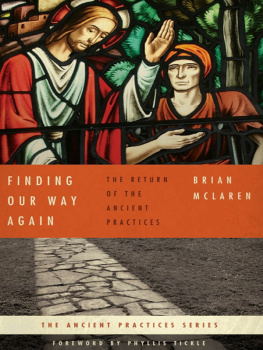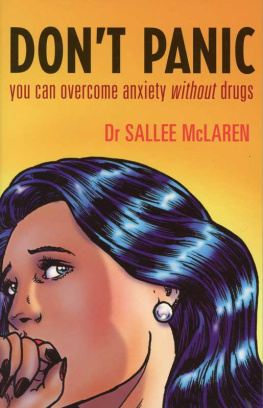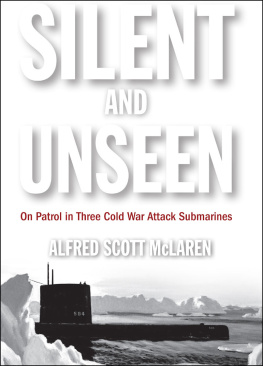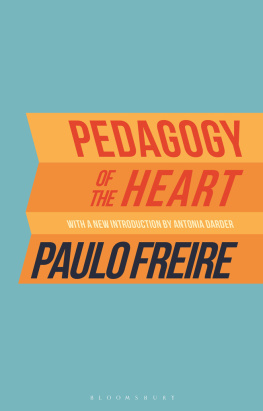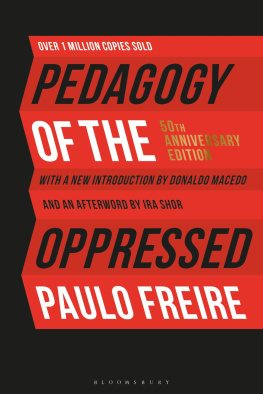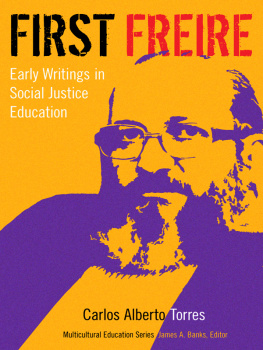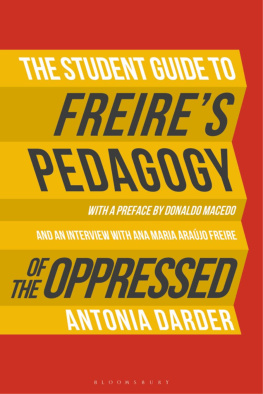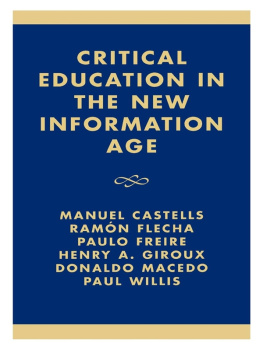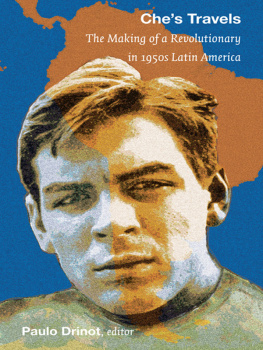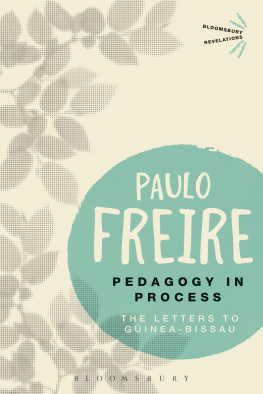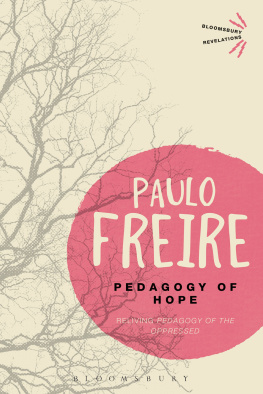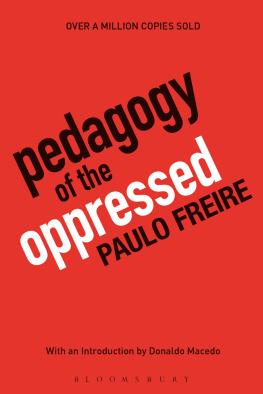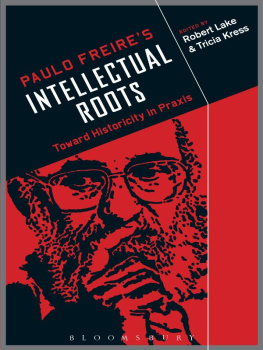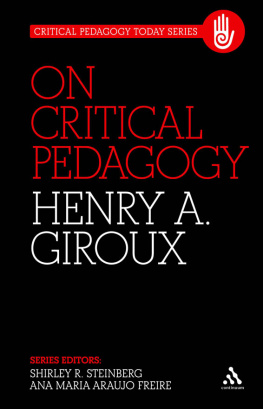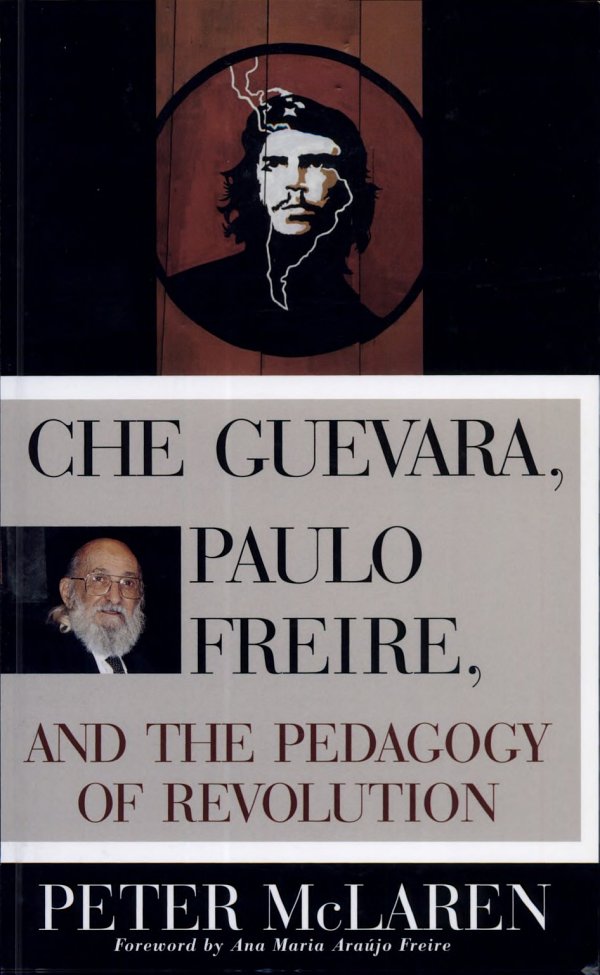
More praise for
CHE GUEVARA, PAULO FREIRE.ANDTHE PEDAGOGY OF REVOLUTION
by Peter McLaren
"A must read for all those who dare embrace a truly revolutionary pedagogy of the oppressed."Donaldo Macedo, University of Massachusetts, Boston, author of Literacies of Power
"In this lucid and theoretically informed reappraisal of the legacies of Che and Freire, Peter McLaren has made a significant contribution to a renewed Marxist theory. Where critiques of capitalism seem to be out of fashion, this volume engages the lives of two great revolutionaries in the context of 'globalization' and increasing class inequality."Rodolfo D. Torres, University of California, Irvine, co-author of Latino Metropolis
"A sweeping and provocative work that raises pedagogical theory to new heights."Carl Boggs, author of The Two Revolutions: Gramsci and the Dilemmas of Western Marxism
"A book on Che Guevara and Paulo Freire? Once again Peter McLaren has asked scholars and educators to confront our own political limitations and imagine the unimaginable: Educational revolution is achievable."Louis F. Miron, University of California, Irvine, author of The Social Construction of Urban Schooling
"McLaren's exploration into the similar and divergent theoretical positions of Che and Freire's contributions to our understanding of a revolutionary socialist vision is impeccable. McLaren assists educators to engage more profoundly with the current crisis of global capitalism, in order to construct a renewed socialist project for the new millennium."Antonia Darder, Claremont Graduate University, author of Culture and Power in the Classroom
"... eloquently sums up for the next millennium what critical pedagogy inspired by the life-works of Che and Freire has to offer.... We have much to learn from the visionary reason of these two great heroic 'guerrillas' of the much maligned 'third world.' "E. San Juan, Jr., Washington State University, author of Beyond Postcolonial Theory
Culture and Education Series
Series Editors: Henry A. Giroux, Pennsylvania State University Joe L. Kincheloe, Pennsylvania State University
Race-ing Representation: Voice, History, and Sexuality edited by Kostas Myrsiades and Linda Myrsiades, 1998
Between the Masks: Resisting the Politics of Essentialism by Diane DuBose Brunner
The Mouse That Roared: Disney and the End of Innocence, 1999 by Henry Giroux
Schooling as a Ritual Performance: Toward a Political Economy of Educational Symbols and Gestures, 1999 by Peter McLaren
Literacy as a Moral Imperative: Facing the Challenges of a Pluralistic Society by Rebecca Powell
None of the Above: Behind the Myth of Scholastic Aptitude, Updated Edition by David Owen with Marilyn Doerr
The Ethics of Writing: Derrida, Deconstruction, and Pedagogy by Peter Trifonas
Pierre Bourdieu: Fieldwork in Culture edited by Imre Szeman and Nicholas Brown
Che Guevara, Paulo Freire, and the Pedagogy of Revolution by Peter McLaren
Forthcoming:
Cutting Class: Social Class and Education edited by Joe L. Kincheloe and Shirley R. Steinberg
Between Hope and Despair: Pedagogy and the Remembrance of Historical Trauma edited by Roger I. Simon, Sharon Rosenberg, and Claudia Eppert


This book is dedicated to Jennifer McLaren, in unyielding devotion.
This One
Copyrighted image removed by Publisher
FOREWORD
Joe L. Kincheloe
The beginning of the twenty-first centuryespecially as it coincides with the publication of this bookis probably a good time to proclaim Peter McLaren the poet laureate of the educational left. No one operating in critical education has Peter's capacity to turn a phrase, to focus our attention on the relationship between pedagogy and injustice, or to make us chuckle while moving us to see anew. I am pleased to be privy to Peter's critical humor, unparalleled phraseology, and brilliant insights into the world of the political, cultural, and the pedagogical. These qualities are present throughout this volumemaybe Peter's best work ever.
Only Peter could conjure the following McLarenisms:
The Shroud of Turin: "From the days in 1855 when Sir John Bowrigg, the Victorian bureaucrat, proclaimed 'Free Trade is Jesus Christ and Jesus Christ is Free Trade' to the current era where Christian fundamentalists such as the Reverend Jerry Falwell proclaim capitalism, democracy, and Jesus to be as seamlessly connected as the Shroud of Turin and equally as mystical, there has been a willful ignorance surrounding the paralyzing effects that the victorious embrace of capitalism has had on the powerless and destitute of the world."
Bargain-basement capitalism: "Enduring imbalances in the 'globalitarian world'the worldwide problem of overcapacity, the random destruction of the ecosystem by unregulated markets accompanying the new bargain-basement capitalism, the imposition of exchange values upon all productions of value, the creation of a uniform culture of pure consumption or Wal-Martization of global culture, the vampirism of Western carpetbaggers sucking the lifeblood from the open veins of South America, opportunistic politicians, assaults on diasporic cultures, and new waves of xenophobiahave brought about a serious political inertia within the United States Left in general, and within the educational Left in particular."
No-fault apostasy: "And why now, at a time when the marketplace has transformed itself into a deus ex machina ordained to rescue humankind from economic disaster, and when voguish theories imported from France and Germany can abundantly supply North American radicals with veritable plantations of norisk, no-fault, knock-off rebellion? Why should North American educators take seriously two men who were propelled to international fame for their devotion to the downtrodden of South America and Africa?"
Sunday School proselytizing: "The conceptual net known as critical pedagogy has been cast so wide and at times so cavalierly that it has come to be associated with anything dragged up out of the troubled and infested waters of educational practice, from classroom furniture organized in a 'dialogue-friendly' circle to 'feel-good' curricula designed to increase students' self-image. It has become, in other words, repatriated by liberal humanism and been transformed to a combination of middle-brow, town-hall meeting entrepreneurship and Sunday School proselvtizing."
These, of course, are only a few examplesthere are countless more throughout the bookof what we have come to expect from Peter. He is undoubtedly one of a kind, as Nita Freire illustrates so profoundly in her tender comments printed here. When Natalie Merchant and her Ten Thousand Maniacs sing about Jack, Alan, Bobby, and the rest of the beat boys howling at night, they can now add a new verse about Peter. Perhaps the funny and loving stories Jenny McLaren can tell about his howl. Nita understands Peter, focusing on his passionate identification with Paulo Freire and Che Guevara and their ability to love. Always devoted to the work and now the memories of Freire and Guevara, Peter, like Nita, recognizes the magical possibilities such a radical love open up for those exposed to it. I have learned enough from Paulo to understand that the critical revolutionary is directed by an irrepressible radical love. Peter makes this point time and again in this work.


